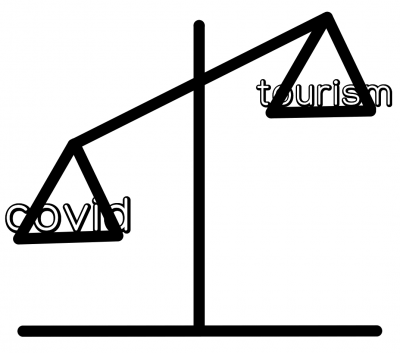Boston Mayor Marty Walsh is funding a $2 million tourism campaign with federal COVID-19 relief money. City Councilor Andrea Campbell, who is running for mayor, has been vocal about her disapproval of Walsh’s plan, saying it “makes absolutely no sense.”
Before making haste judgements about the campaign, it’s important to contextualize Boston’s financials. The City’s Resilience Fund has raised $33.3 million for COVID-19 relief efforts, allocating $3.98 million toward technology for Boston students, $15.9 million toward food security and $8.84 million toward support for health care workers. Boston is also sitting on a $3.61 billion budget for the 2021 fiscal year.

It may appear as if Walsh is simply shelling out money for tourism, but compared to Boston’s hefty budget and other COVID-19 relief programs, $2 million isn’t substantial. However, a campaign promoting tourism is a conflicting narrative from the City’s message in recent months.
Walsh wants to promote tourism and business in areas that have been struggling due to the pandemic and that aren’t as popular for tourism, specifically minority communities. The target audience of the campaign is people who are within driving distance from Boston.
However, we should be focused on circulating business within our community rather than enticing those outside of Boston to come into the city.
Up until this point, local governments in Massachusetts have been fairly cautious about visitors. Just a few weeks ago, municipal officials were pleading that tourists stay out of Salem for Halloween. But now, Boston officials are spending money on tourism advertisements.
Walsh also lacked such a welcoming attitude toward college students returning to school in the city. He had expressed concern about students coming back, for good reason, but is happily inviting tourists into the city. Those who choose to travel right now are also probably the ones taking the coronavirus less seriously, which doesn’t bode well with our rising cases.
Even though this money is a relatively small amount compared to the City’s budget, it ultimately takes away from public health funds. Walsh said in a statement he wants to help the community recover in an “equitable way,” but we can surely find other avenues to stimulate the economy.
Tourism is an important industry in Boston, and some households rely heavily on it to make a living. We cannot leave these people floundering, but it is difficult to support them safely without additional federal aid.
Local and state governments are, in a way, pressured to open the economy back up because they cannot feasibly offer sufficient financial relief to all small businesses. Nonetheless, we can still build our economy back up in other manners.
Walsh should prioritize Boston residents as his campaign audience. Encourage Bostonians to travel to Roxbury instead of the North End, Dorchester instead of Seaport. This way, we can keep our community safe from outside travelers who may be bringing the virus to the city along with their wallets.
The main question is not whether a small business will spread COVID-19 to its customers, but rather, will incoming tourists spread the virus to the community?
Individuals are responsible for taking precautions — wearing a mask, social distancing, avoiding large gatherings and more — to curb the spread of the virus. If we can successfully perform these actions as a whole, but enclosed community, then we could open businesses faster and start livening up the economy. These additional health measures are our only options as we await a vaccine.
We must reopen Boston’s economy in a safe way, but whether we are able to do so is dependent on decisions at a personal level — and the best way to get there is not through inviting outsiders to come flocking into the neighborhoods that are already more likely to experience disproportionately severe cases of COVID-19.


















































































































